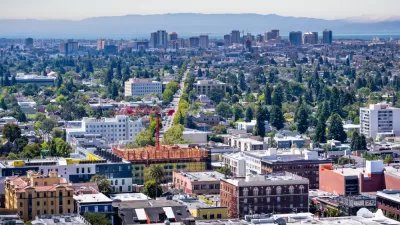Berkeley is the second city in Northern California to approve landmark zoning reforms so far in 2021.

The city of Berkeley, known for many decades as a hot bed of anti-development politics, last night undertook a major step in reforming its zoning code to create incentives for more residential development.
At a hearing that lasted into the evening, the Berkeley City Council approved an ordinance that eliminates parking requirements for residential properties citywide, with a few exceptions on hillside properties.
The City Council voted unanimously to approve the ordinance according to multiple sources in attendance at the hearing last night, including Councilmember Rigel Robinson. The vote marks a significant milestone for the city, which has a reputation for anti-development politics amidst sky-high real estate prices. A recent story about the "conservative" development politics in the city of San Francisco could very well have been written about the Berkeley of the relatively recent past, in addition to the more distant past. That reputation has begun to shift in more recent years, as new leadership has altered the development politics of the City Council. In 2019, the city decided to study zoning for new Missing Middle Housing, and the city was among the first to ban natural gas in new buildings.
An article by Patrick Siegman detailed the Berkeley parking reform ordinance before the City Council's vote. Siegman provides specific details about the ordinance, in addition to explaining the thinking behind parking requirement reform:
Reforms recommended by the Planning Commission would remove minimum parking requirements for all residential land uses, with the exception of some lots located on roadways less than 26 feet wide in hillside areas. The Planning Commission also recommends adopting maximum parking limits and instituting transportation demand management requirements for residential land uses.
The city of Berkeley's decision to eliminate parking requirements for residential properties follows just days after the city of Sacramento, located 90 miles to the northeast of Berkeley, approved landmark parking reforms while approving citywide zoning changes.
FULL STORY: Should Blind People in Berkeley Be Required to Buy Parking Spaces?

Florida Considers Legalizing ADUs
Current state law allows — but doesn’t require — cities to permit accessory dwelling units in single-family residential neighborhoods.

Manufactured Crisis: Losing the Nation’s Largest Source of Unsubsidized Affordable Housing
Manufactured housing communities have long been an affordable housing option for millions of people living in the U.S., but that affordability is disappearing rapidly. How did we get here?

Research Shows More Roads = More Driving
A national study shows, once again, that increasing road supply induces additional vehicle travel, particularly over the long run.

EV Chargers Now Outnumber Gas Pumps by Nearly 50% in California
Fast chargers still lag behind amidst rapid growth.

Affordable Housing Renovations Halt Mid-Air Amidst DOGE Clawbacks
HUD may rescind over a billion dollars earmarked for green building upgrades.

Has Anyone at USDOT Read Donald Shoup?
USDOT employees, who are required to go back to the office, will receive free parking at the agency’s D.C. offices — flying in the face of a growing research body that calls for pricing parking at its real value.
Urban Design for Planners 1: Software Tools
This six-course series explores essential urban design concepts using open source software and equips planners with the tools they need to participate fully in the urban design process.
Planning for Universal Design
Learn the tools for implementing Universal Design in planning regulations.
City of Moreno Valley
Institute for Housing and Urban Development Studies (IHS)
City of Grandview
Harvard GSD Executive Education
NYU Wagner Graduate School of Public Service
City of Cambridge, Maryland
Newport County Development Council: Connect Greater Newport





























